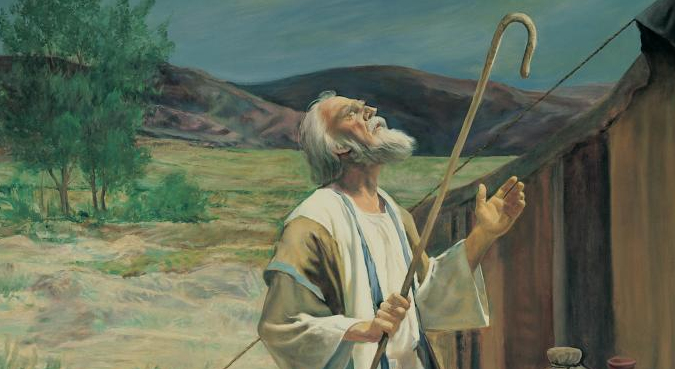“And I will establish my covenant between Me and you and your offspring after you throughout their generations for an everlasting covenant, to be God to you and to your offspring after you.”
(Genesis 17:7)
Following God’s leading and obeying His directives often include letting go of the familiar and safe. A perfect Old Testament example of this is Abram (whom God later renamed Abraham). Abram and his wife Sarai lived in his father’s house when God called him to leave the familiar and go into the unknown… to leave his own country and kindred and go to a land inhabited by pagans (Gen. 12:1-3).
Naturally, the thought of doing such a thing elicited fear in Abram. He was concerned for the safety of himself and his dear family. Striking out across the desert with all your family and everything you own was quite an ask. Abram no doubt found himself imagining everything that could go wrong in such a venture. What would this cost him? Who might be killed? What kind of loss might they suffer in such a journey?
Understanding his concerns, God tells him in Genesis 15:1, “Do not fear Abram, I am your shield, and your exceedingly great reward.” Abram believed God… and consequently obeyed His calling. “And Abram took Sarai his wife, and Lot his brother’s son, and all their possessions that they had gathered, and the people that they had acquired in Haran, and they set out to go to the land of Canaan,” (Gen. 12:5).
Once in Canaan, Abram found himself and his family among strangers, idolaters, and atheists. The Canaanites, descendants of Ham, were wicked people whom God had allowed to “fill up the measure of their sins” over a period of four hundred years.
Abram, referred to as the “friend of God,” now finds himself right smack in the middle of them. Does Abram have cause to fear? No, for the Lord Himself, the Lord God Almighty, was more than sufficient to save and protect him, his family, and all his possessions.
Again, God told him: “I am your shield, and your exceedingly great reward.” This is infinitely more significant than if God had said, “I will shield you, and reward you.” That would have been enough. And yet God promises Himself to Abram, to both protect him (shield) and bless him (exceeding great reward) as result of the covenantal relationship between them. God was not only God, you see. He was Abram’s God.
It is as if God said, “Do not fear dangers, nor enemies, for I am your shield. Do not fear lack or loss of anything, for I am your reward. Are any dangers so great, any enemies so strong, that I cannot shield you against them? I am ready to cover you with My wings and defend you against all the wickedness of the world and all the legions of hell. And if you suffer loss, in turn I give you Myself and a kingdom inheritance which infinitely makes up for it all.”
William Gearing astutely said, “Even when God takes away health, wealth, goods, liberties, and outward comforts from His people, He has made up all their losses beforehand; He has given Himself, an infinite God, to be their portion.”
Herein lies the fullness of Christ in this great promise found in Genesis 17:7-8, “I will establish My covenant between Me and thee, and thy seed after thee in their generations, for an everlasting covenant to be a God to thee, and unto thy seed after thee.”
God does not simply say that He will be a helper to you. He says, rather, that He will be God to you. He gave Himself on the cross. He gives Himself as Mediator continually on our behalf before the Father. He gives His Spirit to us as security to life eternal and abundant.
If you are under the covenant of grace… if you believe by faith in the One True God as Abram did, then you also have God as your shield, and your exceedingly great reward!
- Lord, such a Scripture as this demonstrates how foolish we are when we make acquiring material goods our chief concern. Such things are only temporary anyway. Besides, when all we think about is our goods, our money, our comforts, our health, our food, houses, lands, and possessions… we have no place in our heart and mind to consider You at all.
- It is a sad thing, Lord, that heaven is not a desire of the wicked. Covenant blessings and the riches of grace are the least of their thoughts and endeavors.
- I find it interesting that people who don’t have time for You, Father, when they are strong and fit and healthy decide to consider You when they are at the point of death. This is not only a sad reality; it is very often too late.
- Lord, how can I overlook or disregard the truth that You are my exceedingly great reward? If my life and all my attention go to acquiring earthly possessions, as King Solomon repeats over and over in Ecclesiastes… I have wasted my life. It would be all in vain because when I die, I leave it all behind.
- Because there is no need for earthly riches in heaven, what good is it to love riches more than grace and to spend my life seeking wealth and acquiring possessions instead of seeking You? Abram found that he had an exceedingly great reward in You, O Lord. As Job said, “Naked came I out of my mother’s womb, and naked shall I return there: the LORD gave, and the LORD has taken away; blessed be the name of the LORD,” (Job 1:21). Help me, Father, to see all these things clearly that I may spend my days seeking after You.
Further References for Genesis 17:7
Lev. 26:12; Gen. 26:24; Heb. 11:16; Exo. 3:6.


